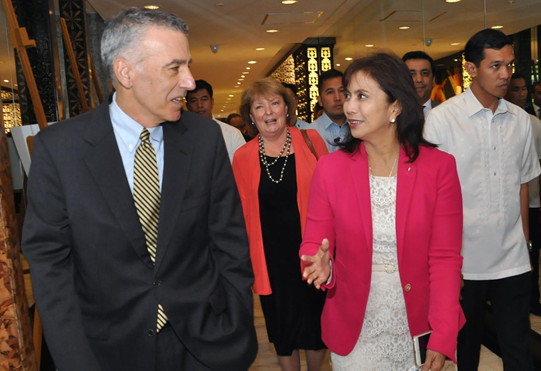
Vice President Ma. Leonor “Leni” Robredo (second from right) is flanked by US Ambassador to the Philippines Philip S. Goldberg (left) and United States Agency for International Development mission director Dr. Susan Brems (center) during the 2016 International Conference on Urban Development organized by the USAID from July 12 to 13 in Manila. PHOTO BY USAID SURGE
Vice President Maria Leonor “Leni” Robredo has said that it remains a challenge for the government to promote urban development and inclusive growth in secondary cities or the ones outside the big metropolis like Manila, Cebu, and Davao.
“It is our collective struggle to turn urbanization from a problem into an opportunity. We still have the chance of guiding our secondary cities’ urban development and address challenges like traffic, urban planning and housing before they become unmanageable,” Robredo said during the International Conference on Urban Development at Sofitel Philippine Plaza held this week.
Robredo, who recently took oath as head of the Housing and Urban Development Coordinating Council, met with urban poor leaders on Wednesday, as she vowed to address the 1.4-million housing backlog within her term.
Organized by the US Embassy in Manila’s United States Agency for International Development (USAID), the three-day conference circled on discussions like “promoting social inclusion in urban environments, improving business climate for investments, addressing climate change and disaster risks, solving urban land tenure issues, and fostering technological solutions for urban development, among others.”
In her opening remarks, USAID mission director Susan Brems noted that cities play a “significant and growing” role in the Philippine and global economy amid increasing urbanization.
“Cities are magnets of economic activity and prosperity, and are the primary drivers of investments and jobs—crucial elements to achieving broad-based, inclusive, and sustainable growth,” Brems said.
“Much of the country’s growth is concentrated in and around Metro Manila. We need to expand and disperse economic opportunity across the country,” she added.
US Ambassador to the Philippines Philip Goldberg said development and inclusive growth in secondary cities presented a “tremendous opportunity” amid a growing urban population.
“With half of the Philippines’ population of more than 100 million living in cities, urban development presents a tremendous opportunity to pursue resilience and inclusive growth of secondary cities outside of Metro Manila, Cebu, and Davao,” Goldberg said.
The conference was attended by international and local planning experts, policymakers, government officials, and industry and business leaders.